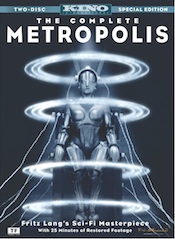
The Complete Metropolis
directed by Fritz Lange
starring Gustav Fröhlich and Brigitte Helm
Kino International

If there’s one silent film that’s held up against the onslaught of sound, Technicolor, and 3D acrophobia, it’s Metropolis. This 1927 classic came from the lens of Fritz Lang, one of the groundbreaking directors of the 20th century, and it captures the zeitgeist in Weimar Germany in the stable period before the rise of the Nazis. The story came from Lang’s wife, Thea von Harbou, and the allegorical plot begs for enlightened labor relations in the face of avaricious capitalism. What keeps this film fresh is its exciting look and feel. Innovative special effects and a huge budget (15 million Reichsmarks, back when a Reichsmark could get you a beer and bratwurst) made it an art masterpiece and a touchstone for period architecture and fashion.
The world of the Metropolis is split in two. Up in the sunny art deco heights live the healthy, wealthy, and careless. Down below in subterranean industrial hell live the nameless Myrmidons of labor, tending monstrous machines and living on the edge of exhaustion. Freder (Fröhlich) chases women and plays tennis in a fantasy world his father Joh (Alfred Abel) created for him. Maria (Helm) and her brood of daycare children get a glimpse of this world, and Freder falls for her. He takes off to the underworld, where appalling conditions convince him to swap places with “11811” (Erwin Biswanger). In his slumming, he finds Maria, joins the labor collective, and battles the evil inventor Rotwang (Rudolf Klein Rogge). The workers rise, destroy the machines, and pretty soon the place looks like Berlin after the Americans waited for the Russians to arrive.
The acting is full of the stereotypical wild gestures of the era, and the makeup slathered on to give a realistic flesh effect on the slow film stock of the day. But putting that aside, the story is well told and gripping. Will Freder find Maria? Will the children be saved? Will Grot (Heinrich George) obey an obviously bad order from Joh? The adventure plays out against a futuristic world of models, optical effects, and clever use of mirrors to reflect actors into miniature sets. The transformation of the “Man-Machine” into a simulacrum of Marie echoes through the years, you see it in music videos and documentaries to this day.
For this Kino International release, nearly 25 minutes of lost footage is restored from a private print discovered in Buenos Aires. Having seen the Giorgio Moroder restoration from 1984, I’m happy to report that this version makes much more sense. The characters’ motivations are clear, the dreamy moral of Labor and Management walking hand in hand into the sunset makes sense, and we can see the buildings and battles as Lang intended. This film is making the art house circuit, and it’s out on Blu-Ray for those of you in the suburbs. If you must watch one silent film for your Full Sail history credit, this is the one to see.












